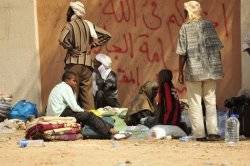Leon Panetta, the US defense secretary, says NATO air raids in Libya will continue as long as there is heavy ground combat between supporters of former leader Muammar Gaddafi and fighters loyal to the country's new leaders.
Speaking during a visit to Cairo, the Egyptian capital, on Tuesday, Panetta said he could not predict when the air campaign would be concluded.
"As long as there is fighting that continues in Libya, I suspect that the NATO mission will continue," he told reporters.
When asked how long NATO's air campaign would last, he said, "I think fighting has to end."
The Pentagon chief said he expected to have a better sense after discussions in Brussels this week with fellow NATO defense ministers.
Allied air strikes began in March and helped tipped the balance in favor of anti-government fighters who overran the capital, Tripoli, in August.
The poorly trained but now battle-hardened fighters of the National Transitional Council (NTC) have surrounded Gaddafi loyalists in Sirte, east of Tripoli, and Bani Walid southeast of the capital, with limited success so far in dislodging them.
NATO planes struck targets in Sirte on Sunday, but Gaddafi loyalists were still in the fight, retaliating with rockets and rocket-propelled grenades the following day.
"Obviously there continues to be fighting by Sirte", Panetta said, adding, "We still don't know where Gaddafi is. And so there still are some question marks with regards to the situation."
Panetta, however, said the conflict "certainly is moving in the right direction" and "a lot of progress has been made" since the operation was launched in March.
Hundreds of residents flee
In Sirte, hundreds of residents have been fleeing in packed vehicles, with some sitting on top of possessions piled high in the rear of vehicles.
Farak Mussa, whose blue minivan was carrying his family of eight jammed in beside
mattresses and suitcases, said he had held out for days for fear of the NTC fighters but the ferocity of the clashes finally made him take the chance, the AFP news agency reported.
mattresses and suitcases, said he had held out for days for fear of the NTC fighters but the ferocity of the clashes finally made him take the chance, the AFP news agency reported.
"We were afraid to come out because they (Gaddafi loyalists) told us that the NTC would cut our throats. But we couldn't stay because of the bombing - we had to take the risk. Why is NATO bombing us?" he asked.
There was fierce fighting on the front line on the western side of Sirte on Monday after what NTC forces said was a rocket and rocket-propelled grenade barrage against their positions by Gaddafi forces inside the city.
NTC fighter Mohammed Shahomi had little sympathy for the long line of people waiting to leave the town.
"They are all Gaddafi loyalists," he said. "You think they are leaving because they believe in the revolution? They are just scared."
Supplies running out
Fleeing civilians spoke of an increasingly desperate situation inside Sirte as food supplies ran out.
An International Committee of the Red Cross team managed to deliver some desperately needed medical supplies on Monday.
But the persistent exchanges prevented it from carrying out a more detailed assessment of the needs, the ICRC said.
"ICRC staff crossed the front line with a fully loaded truck from the west side of Sirte," it said in a statement.
"Fifty oxygen cylinders and other items required for hospital care were handed over to medical staff and representatives of civil society."
Hichem Khadraoui, the ICRC delegate in charge of the operation, said the situation on the ground was very tense with ongoing fighting. But he said the organization hoped to return to the town soon.
PHOTO CAPTION
Displaced families from Sirte, fleeing clashes between pro-Gaddafi forces and anti-Gaddafi fighters, pass through Ashreen Gate, 20 km (12 miles) east of Sirte October 4, 2011.
Al Jazeera


 Home
Home Discover Islam
Discover Islam Quran Recitations
Quran Recitations Lectures
Lectures
 Fatwa
Fatwa Articles
Articles Fiqh
Fiqh E-Books
E-Books Boys & Girls
Boys & Girls  Articles
Articles










